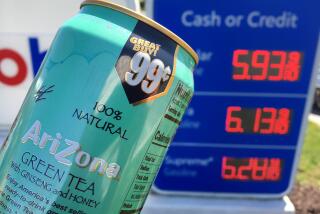Buying Bottlers Sign of New Era for Coke, Pepsi
- Share via
Big changes are occurring in the soft-drink business. Coca-Cola Co. is spending $2.4 billion to acquire its own bottlers in Los Angeles, Houston, Dallas and Denver, among other cities. Rival Pepsico recently laid out $590 million to acquire Minneapolis-based MEI Corp., which bottles and delivers Pepsi-Cola in 15 states of the Midwest and West. Further consolidation is likely.
So what? If big money makes bigger organizations, does that have anything to do with soft-drink consumers? Will it make a can of Coke or Pepsi cheaper or more expensive?
The answer, perhaps surprisingly, is that it has everything to do with today’s consumers, who are forcing the soft-drink industry to hop to their demands just as every other consumer business is having to do. And the consumer as king is far more likely to keep soft-drink prices down than to push them up.
Passing of an Era
What we see in soft drinks is the passing of one era in American business and the confirmation of another. What is passing was ingenious--a relationship of the soft-drink companies and their independently-owned local distributors that originated 87 years ago when Benjamin Thomas and Joseph Whitehead, two lawyers from Chattanooga, Tenn., journeyed to Atlanta to ask Asa Griggs Candler, founder of Coca-Cola, if they could bottle his fountain soda.
Candler responded by giving the young men a perpetual contract stating that he would supply them with concentrate and back them with advertising while they could bottle and sell Coca-Cola throughout the country as long as there was no expense or liability to the Atlanta company. Candler offered no financing, so after paying him $1 to seal their deal, Thomas and Whitehead turned to another Chattanooga lawyer, John T. Lupton, who advanced $5,000. Thus was born the company that became JTL Corp., Coke’s largest bottler, and the bottler system that is credited with having created more millionaires than any other product.
Conceivably, make that billionaires. Earlier this month, Lupton’s grandson sold JTL Corp. to the Atlanta parent for $1.4 billion. As the Chattanooga folks had originally suggested the independent bottler system to Atlanta, the Luptons approached Coke to suggest a new relationship. After some negotiations, he decided to sell altogether, and Coke will now combine JTL with the bottler properties that it is acquiring for $1 billion from Beatrice Cos. (which include Coca-Cola Bottling Co. of Los Angeles) to form a separate company, shares of which it may eventually offer for sale to the public.
More Demanding Business
Why did the Luptons want to sell? Because the consumer has made the business much more demanding on local bottlers. Where once they handled Coke or Pepsi in a single package, now they must handle more than half a dozen varieties of each--Diet Coke, Cherry Coke, Diet Cherry Coke--to say nothing of Slice, Sprite, Tab and Mountain Dew, in a bewildering variety of packages and at a bewildering range of prices, depending on the special deals that change from week to week and from market to market.
Where “bottling used to be an excellent business,” says William Dolan, the publisher of Beverage Industry magazine, “now it is difficult for the local entrepreneur.”
So enter the parent companies that want greater control of distribution in a business now dominated by constant new-product introductions and expensive television advertising. Aha, you say, does all that show biz cost the consumer money? Not so you’d notice.
You may recall the jingle of the late 1940s that sang of Pepsi-Cola’s 12-ounce bottle as “twice as much for a nickel, too”--a comparison to Coke’s 6 1/2-ounce bottle. Well, if you do a little arithmetic, and factor in the effect of inflation since, say, 1947, you would find that at $1.69 for the two-liter bottle, the consumer is getting Pepsi today at roughly the same unit price--while at the sale price of 99 cents, it’s a steal. With Pepsi and Coke battling each other more directly--without bottlers as middlemen--the price competition should only get more severe.
Does that mean the business has become a bad one? If and when Coca-Cola offers shares in its new bottling company to the public, will it be a sale of distress merchandise?
Not at all. “It’s a wonderful business,” says veteran soft-drink analyst Emanuel Goldman of Montgomery Securities. “Like all consumer businesses, it’s more complicated than it used to be,” he says.
But have a little perspective. Where the beer business is flat and liquor is declining, abstemious Americans keep the soft-drink business growing 4% to 6% a year, every year. And that is unlikely to change.
More to Read
Inside the business of entertainment
The Wide Shot brings you news, analysis and insights on everything from streaming wars to production — and what it all means for the future.
You may occasionally receive promotional content from the Los Angeles Times.










